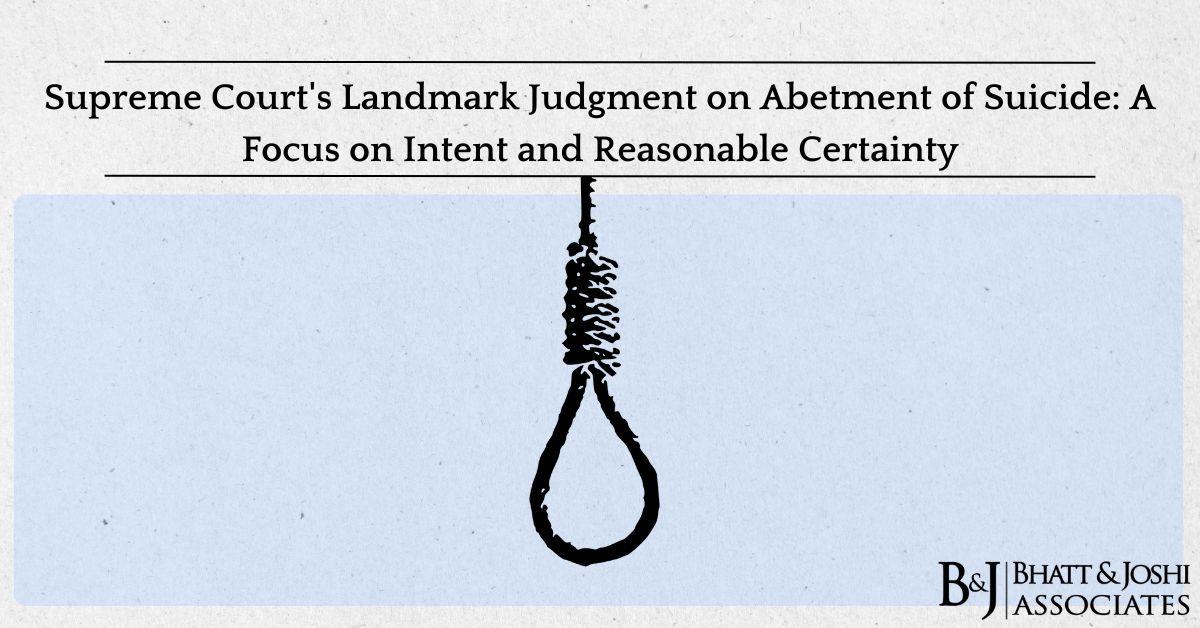Introduction to the Supreme Court’s Judgment
A major judgement that elucidated a fundamental distinction regarding the offence of abetment of suicide under Section 306 of the Indian Penal Code (IPC) was recently given by the Supreme Court of India, marking a significant milestone in the legal system. In this particular verdict, the case that was at the heart of it was Kumar Shiva Kumar, who had been found guilty under this particular clause. During the presentation of the ruling, which was made by a two-judge panel consisting of Justice Bela M. Trivedi and Justice Ujjal Bhuyan, the importance of intent and reasonable certainty in determining instigation was emphasised.
Distinction on Intent and Reasonable Certainty
In its decision, the court emphasised that a word that is shouted in a fit of fury or emotion and does not have a true aim for the consequences that will follow cannot be considered to be an act of instigation from the speaker. In this particular case, the accused, Kumar Shiva Kumar, was contesting his conviction, which prompted the court to investigate the legal complications that are associated with the term “instigation.” In the judgement, it was made clear that in order for an act to be constituted incitement, it is not necessary for particular words or actions to clearly imply the conclusion. It is necessary, however, that there be a perceptible reasonable certainty in order to provoke the result.
Legal Complexities: Exploring “Instigation” in Cases of Abetment of Suicide
It was stated by the prosecution that the accused, who was a renter in the property where the deceased person had lived, had threatened her, which ultimately led to her taking her own life. In cases involving poisoning, when the recovery of traces of poison is of the utmost importance, the court conducted a thorough and critical examination of the evidence. Because of this, important issues were raised regarding the absence of essential items at the scene of the incident, such as the syringe, the needle, or the container containing the poison.
Critical Examination of Evidence in the Case
In addition to expressing worry over the holes in the prosecution’s case, the court brought attention to the fact that there was no inquiry done regarding the missing of these essential items. It emphasised that in circumstances of this sort, the recovery of such components is an essential component of the chain of evidence that is required to demonstrate whether the individual was a victim of homicide or suicide.
Concerns Over Prosecution’s Gaps in Alleged Abetment of Suicide Cases
In addition, the decision acknowledged the complex nature of human feelings as well as the myriad of factors that can motivate someone to make an attempt at suicide. The point was driven home that not every suicide is necessary accompanied by the participation of a third party. When it comes to deciding guilt, the circumstances surrounding the deceased person play a significant role. In this particular case, the court did not find any evidence to establish the appellant’s guilt of abetting suicide.
Human Emotions and the Dynamics of Abetment of Suicide
As a consequence of this, the Supreme Court granted the appeal and overturned the conviction that had been handed down against Kumar Shiva Kumar. This verdict serves as a reminder of the rigorous review of evidence that is required in criminal cases, particularly those instances that involve emotional outbursts and the potential legal implications that may result from them that are involved. As a result, it sustains the legal norm that in order for an act to be called instigation in situations involving the aiding and abetting of suicide, it must be capable of establishing both intent and reasonable certainty.














